The Clockwork Rocket Read online
Page 3
Vito addressed his father. “What do you think?”
“This will do.” Dario turned to Yalda. “No arborines here, I promise.”
“They don’t frighten me,” she said.
When Dario had climbed down, Yalda began resorbing the top halves of her long front legs. She was too tired to think carefully about her shape, but all it really took to regain her old posture was a forceful renunciation of the wariness she’d cultivated during the trip, when relaxing back to normality would have sent her grandfather sprawling onto the road.
Vito emptied his pouches onto the ground and made himself bipedal too, then he and Yalda worked together to dig spaces for the three of them to sleep. The roots of the plants ran deep, and Yalda’s fingers had to bifurcate three or four times to slip into the soil alongside them and prise the whole mass loose; still, with her father helping the whole task was not too daunting. The worms whose homes she was wrecking were fatter and feistier than those she was used to, and after realizing that they weren’t simply going to flee from her touch she started flinging them away across the clearing.
By the time the three indentations were ready, Yalda was almost asleep on her feet. As Dario waddled toward his bed on two short legs—the only limbs he was now sporting—he turned to Yalda. “Thanks for bringing me here, Vita. You did a good job.”
Yalda didn’t correct him; whatever was going through his mind, he’d managed to make the compliment sound sincere. Vito shared a glance with her that she took to express amused concurrence with Dario’s sentiment, then he bid her goodnight.
Yalda was exhausted, but she stood for a while beside her grandfather, gazing down at his sleeping form. Giusto had claimed that he’d seen Dario glowing yellow at night. If they wanted to judge the efficacy of Doctor Livia’s cure, shouldn’t they check for this symptom, both now and when they returned? Yalda had noticed that she cast a multitude of shadows, so she’d hoped to see how Dario appeared from within them—but alas, none was deep enough to reveal what light, if any, was emerging from his skin. Wherever she stood, she couldn’t shield him from every flower at once and observe the luminosity of his body alone.
It was frustrating, but as she gave up and crawled into bed, Yalda thought of the bright side. If any light emerging from Dario’s skin was so faint that it was hidden by the forest’s glare, surely that meant that whatever hue he’d been losing back on the farm was now being replenished faster than it was leaking away.
She wriggled deeper into the cool soil, squashing a few worms who’d escaped her earlier evictions, and gazed up into the violet backlight. She thought about the arborine—skulking along the branches somewhere, angrier than the worms—but if he came for her in the night she’d been forewarned. And if he snatched the men, smaller morsels that they were, she’d forego Amata’s tortuous history of guilt and redemption and just cut them free first thing in the morning.
To Yalda’s delight, the forest by day did show some fidelity to Dario’s story: many of the smaller flowers in the undergrowth, shielded from sunlight by the canopy of branches, really did retain their radiance.
Most of the clearing, though, was not entirely sheltered from the sky. With the violet flowers curled up into crumpled sacs, sunlight spilled through the net of vines that had supported their outstretched petals, mottling the ground with brightness.
After breakfast, Yalda dug storage holes for the loaves they’d brought, and Vito used some of the groundflower petals in which they’d been wrapped as lining. Yalda didn’t trust the worms here to obey the usual rules, but her father assured her that the pungent scent of the petals would keep any vermin away.
Once that job was finished, Yalda had nothing left to do but gaze into the forest. It was a strange situation; if she’d been moping around on the farm Vito would have quickly found her a task, and if there’d been no work at all her cousins and siblings would have dragged her into some game or other with their usual boisterous energy.
At noon, Vito brought out three more loaves. Dario remained half-buried as he ate, emitting unselfconscious chirps of pleasure. Yalda stood watching the slight movements of the branches around her, trying to unravel their causes. Over the course of the morning, she had learned to tell the difference between the swaying motion brought on by the wind, which was shared by many branches at once, and the trembling of a single branch when a small lizard ran along it. Sometimes she could even spot the successive rebounds when a lizard launched itself from one branch and landed on another.
“What do lizards eat?” Yalda asked Vito.
“Insects, maybe,” he replied. “I’m not sure.”
Yalda contemplated the second part of his reply. How could he not be sure? Were there things about the world that adults didn’t know? Dario offered no verdict on the lizards’ diet, and though he might just have been too preoccupied to bother, Yalda was beginning to wonder if she’d misunderstood something important. She’d thought that every adult’s role was to instruct their children and answer their questions, until the children knew all there was to know—by which time they were adults too. But if some answers weren’t passed down from generation to generation, where did they come from?
Judging that it would be impolite to probe the extent of Dario’s knowledge in his hearing, Yalda waited until he had dozed off again.
“Who taught you about the stars?” she asked Vito. “All those things you were telling me last night?” She had never heard Dario speak about the origin of the color trails.
Vito said, “I learned that from your mother.”
“Oh!” Yalda was astonished; how could you learn anything from someone your own age? “But who taught it to her?”
“She had a friend, a girl named Clara.” Vito spoke slowly, as if the subject required some special effort to address. “Clara went to school. She’d tell your mother about the things she’d learned, and then your mother would explain them to me.”
Yalda knew there was a school in the village, but she’d always thought its purpose was to train people for unfamiliar jobs, not to answer their questions about the stars.
“I wish I could have met her,” she said.
“Clara?”
“My mother.”
Vito said wryly, “That’s like wishing you could fly.”
Yalda had heard the phrase before, but now it struck her as an odd choice for the epitome of unattainability. “What if we stretched our arms wide, like a mite’s wings—”
“People have tried that,” Vito assured her. “We’re too heavy, and too weak; it just doesn’t work.”
“Oh.” Yalda returned to the subject of her mother. “What else did she teach you?”
Vito had to think about that. “A little bit of writing. But I’m not sure I remember much.”
“Show me! Please!” Yalda wasn’t sure what the point of writing was, but the prospect of seeing her own father perform the elaborate trick was irresistible.
Vito did resist, but not for long. “I’ll try,” he said. “But you’ll need to be patient with me.”
He stood for a while, silent and motionless. Then the skin of his chest began to tremble, as if he were shooing off insects, and Yalda noticed some strange, curved ridges starting to appear. They weren’t holding still, though; they were slipping away across his body. Yalda could see him struggling to keep them in place, but he wasn’t succeeding.
Vito relaxed, smoothing out his skin. Then he tried again. This time, a single, short ridge formed near the center of his chest, and though it quivered a bit, it more or less stayed put. Then as Yalda watched, it bent in on itself until it formed a crude circle.
“The sun!” she said.
“Let’s see if I can do the next one.” Vito’s tympanum grew taut with concentration as the ridge spread out and reformed, winding itself into five wide loops.
“A flower!”
“One more.” The flower split apart and the lines that had formed the petals softened, but then the fragments came together in a new
configuration and the ridges grew sharp and clear again.
“An eye!”
“All right, three symbols, that’s enough!” Vito’s shoulders sagged.
“Teach me how to do it!” Yalda pleaded.
“It’s not easy,” Vito said. “It takes a lot of practice.”
“There’s nothing else to do here,” Yalda pointed out. She would have happily gone exploring in the forest instead, chasing the lizards to find out what they ate, but they couldn’t leave Dario behind.
“I suppose we could try one symbol,” Vito said reluctantly.
He beckoned to her, and Yalda knelt down so she was closer to her father’s height. He sharpened a finger and began scratching gently on her chest, never moving from the same small spot. Soon his touch was as irritating as the attentions of any insect.
Yalda squirmed; her skin was quivering, but that was giving her no respite. A mite would be swiftly unseated, but this prodding finger was far too heavy to dislodge.
“Don’t move your shoulders!” Vito reprimanded her. “Just use your skin. It’s something you’re doing dozens of times a day already, but you have to learn to control it more precisely.”
“I don’t see any shapes yet,” Yalda complained.
Vito said, “Be patient! The first thing is to make yourself aware of what’s going on under your skin. Then you can try to shift the point where it’s happening.”
It was harder than changing her posture, harder than reshaping her hands, harder than anything Yalda had tried to do with her body before. Most transformations took some effort, but once she pushed herself her instincts took over. This was different; the only thing her instincts wanted her to do was stop wasting her time with this ineffectual shuddering and simply sweep away the nuisance with her hands.
But she persisted. Her mother had learned to do this, taught by her friend, then passed on the skill to her father. Impossible or not, her mother’s finger was prodding her, urging her to keep on trying to tame the swarm of tiny muscles beneath her skin.
By the time the clearing fell into gloom and the violet flowers above them unfurled across their nets, Yalda had made her own sun, written on her skin. As she peered down at her chest the dark circle writhed like a worm chewing its tail, then broke apart.
Vito looked wearier from his efforts than she was. “Well done,” he said.
“Can I show Dario?” He’d be amazed, Yalda thought. Not one day in school, and here she was writing!
Vito said, “Your grandfather’s tired, let’s not bother him with this.”
Yalda woke, confused for a moment by the brightness of the clearing. It wasn’t morning; she’d been roused from her sleep by the sound of Dario humming with distress.
She turned to look toward him, then rose to her feet for a clearer view. At first she’d thought that a strong wind must have blown through the forest, tearing petals from the trees and strewing them over his body as he slept. But the patches of luminous yellow belonged to his skin.
Yalda knelt by Dario’s bed; his eyes were closed, but he was thrashing from side to side. She could feel mites coming and going all around him; she tried waving them away, but they were persistent.
She called out to Vito, “Father! Help me!”
As Vito stirred, the haze of sleep cleared from Yalda’s vision and the throng of mites came into sharper focus. Those that were descending onto Dario’s body appeared perfectly ordinary, but those rising up into the forest again, having bitten him, were imbued with their own small share of the strange yellow light. Yalda had never seen anything like it; when an insect fed on a flower it did not take on its glow.
She looked up to see Vito standing across the bed from her. “He’s in pain,” she said. “I think the insects are troubling him.” She widened her hands and fanned more vigorously, hoping her father would join in.
“The heat!” Dario protested miserably. “Is this what childbirth is like? Is this my punishment?” His eyes remained firmly closed. Yalda doubted that he knew where he was or who was tending to him.
Vito said nothing, but he knelt and began swatting at the insects himself. Yalda peered down at Dario, hoping for a sign that their efforts were bringing him some respite from his suffering. A new patch of radiance had appeared, a shimmering yellow smudge that appeared to be leaking out from a tear in his skin. It was spreading at an alarming rate, as if it was made of some unimaginably soft resin. Yalda had never seen anything move so freely, other than the finest dust—but despite the steady breeze this wasn’t scattering like dust.
“What is that?” she asked Vito.
“I don’t know. Some kind of… liquid.”
Vito spoke the last word with an air of dismay, but before Yalda could ask him what it meant the whole clearing lit up, brighter than day. She closed her eyes instinctively; when she opened them the light was gone, but everything looked darker, as if she’d been staring into the sun.
“We have to leave,” Vito declared abruptly.
“What?”
“Your grandfather’s dying. We can’t help him anymore.”
Yalda was stunned. “We can’t abandon him!”
Vito said, “Listen to me: we can’t help him, and it’s not safe to stay with him.”
Dario gave no indication that his son’s terrible verdict had reached him through the thicket of his pain and confusion. As Yalda rose to her feet, forcing herself to obey Vito even though she couldn’t bring herself to believe him, a speck of light hovering in the distance ahead of her erupted into painful, blinding brilliance. As she covered her front pair of eyes with her arm, she thought: that was a mite. The mites that had fed from Dario’s skin and stolen his light were burning up, and each tiny blaze was brighter than the sun.
Still half-blind, she stumbled around Dario’s bed toward her father. “We’re leaving the forest?”
“Yes.”
“Should I bring the food?”
“There’s no time.”
Vito leaned down and whispered something to his father, then he stood and led the way out of the clearing. Yalda stole a glance at Dario, then tore herself away. She would not accept that his fate was sealed; she would not say goodbye.
“Close your rear eyes,” Vito told her sternly. “Stay close to me and don’t look back.”
Yalda obeyed. A third burst of light came from the clearing—behind her now, but even the glare reflected from the branches ahead was dazzling. Dark traces lingered on her vision, a second ghostly forest imprinted on the first, complicating everything.
“I don’t understand!” she said. “I thought the light here would make him better!” If she forced her father to remember Doctor Livia’s pronouncement, and tie what they were seeing to that, maybe he’d change his mind and turn back.
“We tried,” Vito said, stricken. “But some things can’t be healed.”
Yalda pushed her way through the branches angrily, relying on touch more than sight; she was barely registering the ongoing flashes, but the afterimages kept building up until she was no longer sure which looming obstacles were real. Even in the depths of his illness, Dario had retained his gruff affection for her. How could she walk away from him?
They emerged from the forest and headed back toward the road. Maybe the mites were actually helping, drawing the poison out of Dario’s body. Dying in his stead. If they stopped to rest, she’d sneak back while Vito was asleep. If Dario had survived, healed by the self-immolating insects, she could carry him out to rejoin his son.
The ground ahead of her brightened unbearably, then a rush of air knocked her flat. She tried to call out, but her tympanum had seized up, leaving her both mute and deaf. She crawled across the weeds; they looked like dead husks, but she couldn’t tell if they’d really been transformed or whether it was her vision that had been stripped bare. She groped around, sure that Vito was close but afraid to lift her gaze to search for him. Then she felt him reach out to her and they held each other tightly.
They stayed ther
e, huddled together on the ground. Her father’s embrace was not enough to make her feel safe, but it was all there was.
Yalda woke to a brightening sky and the sound of insects. Vito was awake, crouched beside her, but he remained silent as she stood to survey the aftermath.
The forest was still standing but the closest part was visibly thinned and damaged, as if a giant had reached down and pummeled it. Some of the low bushes around them were dead. Yalda’s skin was tender as she moved.
“He’s gone,” she said. Dario could not have survived at the center of this destruction—let alone survived being the cause of it.
“Yes.” Vito rose to his feet and put an arm around her to comfort her. “It’s sad that we’ve lost him, but remember that he had a long life. And most men go to the soil, to decay like straw. Only a few go to light.”
“Is that a good thing?” Yalda had seen how much pain he’d been in at the end, but she had nothing with which to compare it.
“It’s good that we left him in time,” Vito said, avoiding her question. “It would not have made him happier to take us with him.”
“No.” Yalda felt her whole body shaking with an involuntary hum of grief. Vito held her until she was still again.
“We should start moving,” he suggested gently. “It would be best if we reached the farm before night.”
Yalda looked back toward the ruined edge of the forest.
“When I get old,” she said, “what will happen to me?”
“Hush,” Vito said. “That’s the way of men. No daughter of mine is going to die.”
2
In the spring following her grandfather’s death, Yalda joined her cousins, her uncle and her father in the harvest for the first time. While Lucia and Lucio dashed around gathering up spills and wheeling the grain carts between the filling points—as Yalda had done the year before—the harvesters themselves marched steadily back and forth between the rows of wheat.

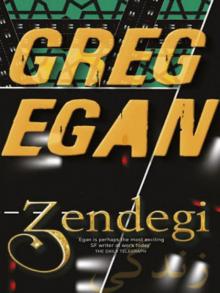 Zendegi
Zendegi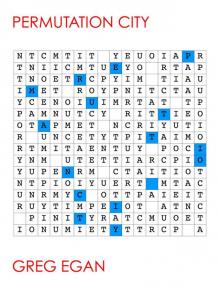 Permutation City
Permutation City The Eternal Flame
The Eternal Flame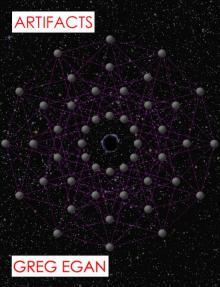 Artifacts
Artifacts Wang's Carpets
Wang's Carpets Dichronauts
Dichronauts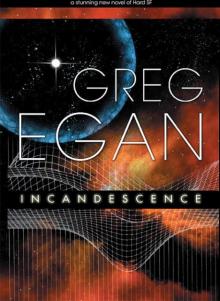 Incandescence
Incandescence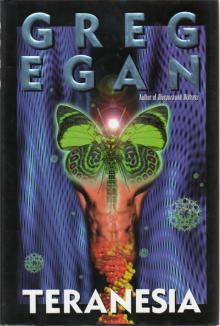 Teranesia
Teranesia Schild's Ladder
Schild's Ladder Quarantine
Quarantine The Four Thousand, the Eight Hundred
The Four Thousand, the Eight Hundred The Clockwork Rocket
The Clockwork Rocket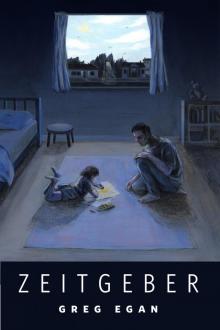 Zeitgeber
Zeitgeber Phoresis
Phoresis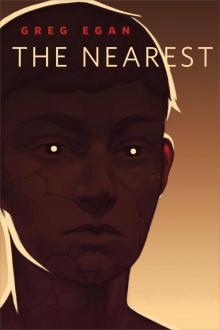 The Nearest
The Nearest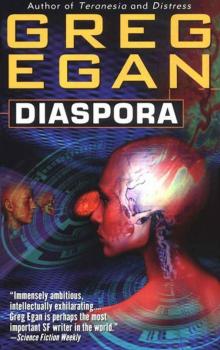 Diaspora
Diaspora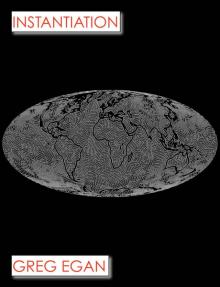 Instantiation
Instantiation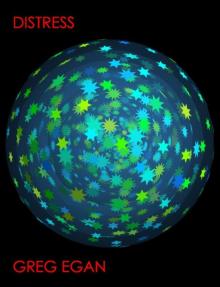 Distress
Distress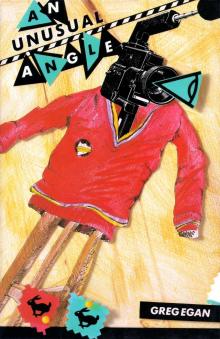 An Unusual Angle
An Unusual Angle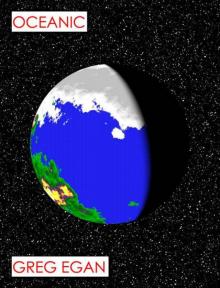 Oceanic
Oceanic The Arrows of Time
The Arrows of Time Axiomatic
Axiomatic![Anthology 2. Luminous [1998, 2010] Read online](http://i1.bookreadfree.com/i/03/18/anthology_2_luminous_1998_2010_preview.jpg) Anthology 2. Luminous [1998, 2010]
Anthology 2. Luminous [1998, 2010] Perihelion Summer
Perihelion Summer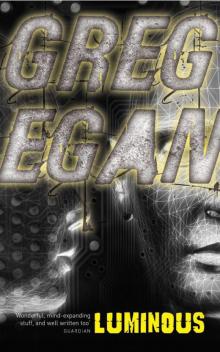 Luminous
Luminous